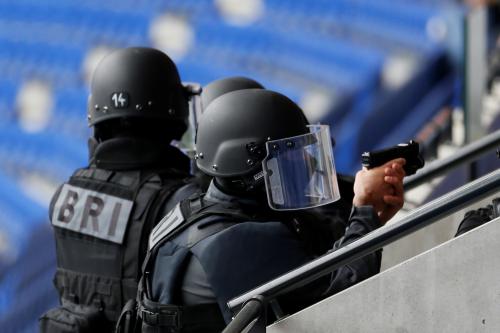Terrorism can undermine political moderation in a democracy, paving the way for more extreme elements to gain footholds. The death toll of a terrorist attack, often inflicted in a spectacular way that draws media attention and leads to political criticism, can undermine faith in government. This lack of faith, in turn, can convince citizens to favor more extreme voices that promise law and order or, if they do not see any hope in government, turn to nongovernmental actors such as gangs or militias for security.
Particularly after 9/11 (and, in Europe, following significant attacks by al-Qaida on public transportation systems in Madrid in 2004, London in 2005, and the Islamic State attack in Paris in 2015), even small terrorist attacks are seen in the context of a threat that is perceived as massive. This is true even though the number of terrorist attacks in Europe is roughly comparable between the pre- and post-9/11 eras, and in the United States the number of deaths from jihadi terrorism is far less than officials anticipated in the years after the 9/11 attacks. Political leaders must act—and must be seen as acting—to fight terrorism. At times, this may be a power grab by government leaders, with terrorism as a justification, but more frequently it represents a genuine, if flawed, understanding of the threat and a response to strong public pressure.
Publics fearing terrorism favor more aggressive policies at home and more hawkish foreign policies. Support for the Obama administration’s intervention in Syria against the Islamic State grew tremendously after the highly publicized beheadings the group conducted on American, British, and other hostages. In both the United States and Europe, terrorism has played into debates on migration, with fears of immigrants or refugees from Muslim-majority states running high. Social trust decreases after a terrorist attack. A Chatham House survey from 2017 found that in the 10 countries surveyed, over half the population “agreed that all further migration from mainly Muslim countries should be stopped,” with only 20 percent disagreeing—a remarkable consensus. A 2017 U.S. poll found that 60 percent of Americans supported the Trump administration’s “travel ban” that severely limits immigration from mostly Muslim countries.
Many of these dynamics played out after the November 2015 Islamic State attack in Paris that killed 130 people, the worst strike Europe had seen since the 2004 al-Qaida attacks in Spain. After the attacks, most of the French public agreed with the statement that France is “at war.” Support for accepting refugees from Iraq and Syria fell, and right-wing political parties gained support. The Paris attacks also affected attitudes elsewhere in Europe and even in the United States, where fears of an Islamic State attack increased. In the weeks following the Paris attacks in November 2015, attacks targeting Muslims in London tripled.
Terrorism and social hostility between Muslims and non-Muslims create a dangerous circle. Terrorist attacks lead to a spike in hostile rhetoric and low-level anti-Muslim violence, which in turn reduces the integration of the Muslim community and creates more tolerance of radicalism. Aspiring autocrats use terrorism in the West and violence linked to Muslims to criticize democracy and justify their strong-arm tactics. Viktor Orbán, Hungary’s prime minister, has deliberately equated Muslim migrants with terrorists as part of his broader critique of liberal democracy, claiming that he wants to keep Hungary safe and Christian.
Leaders are thus in a dilemma. From a policy point of view, they should seek a well-balanced “Goldilocks” position between reassurance and action on the one hand and respect for civil rights and minority communities on the other, with foreign policy favoring a moderate direction. Politically, however, the payoff is often in playing to the fears of the majority, trumpeting a terrorism threat even beyond the danger posed.
Reducing the number of terrorist attacks and their lethality is vital for limiting the political impact of terrorism as the attacks themselves heighten anti-Muslim sentiment. Although demagogues can and will play up any attack, it is far easier for them to do so after massive strikes like the 2015 Paris attack than it is after less lethal attacks, especially if they are infrequent. Thus, an array of military measures against terrorist sanctuaries overseas, intelligence-sharing to disrupt terrorist travel, and policing at home remain necessary and must be resourced appropriately. Intelligence-sharing within Europe is particularly important as violence in one country—Paris in 2015, or the Danish cartoon controversy—can easily spill over into other European countries, and some cells, such as the one that carried out the Paris attacks, operate across national borders. The high social and political cost of terrorism suggests this should be a priority even when the terrorism threat is ebbing, as it appears to be at this time.
To prevent a vicious circle, security services must also target right-wing terrorism. In the United States, right-wing violence has grown, with Jews and Muslims in particular being targets—and, even worse, President’s Trump rhetoric and actions are viewed as encouraging or at least tolerating this hatred at a time when he has cut programs focusing on right-wing groups even amid a growing threat. Given the recent decline in jihadi violence, transferring some resources is appropriate. In the United States, Congress should authorize more funding to address this problem.
Promoting integration of immigrant communities is also essential. Historically, this was an American success story. In contrast to Europe, the American Muslim community is far better integrated and regularly cooperates with law enforcement. Ideally, the president would press state and local officials to continue and expand their work with Muslim communities, not just to stop radicalism in their ranks but also to protect them from right-wing extremists. Besides being the right thing to do, good relations with Muslim Americans, especially in an atmosphere where many face daily security threats, will help ensure that radicalization remains low and that if and when it occurs the community cooperates with law enforcement.
With the collapse of the Islamic State’s above-ground presence in Iraq and Syria and the fall in arrests and plots in the United States and Europe, now is an ideal time to focus on tougher problems like integration and broaden counterterrorism to include other threats. The Trump administration and many European governments appear unlikely to do so, but Congress and future administrations should prioritize these efforts.
The Brookings Institution is committed to quality, independence, and impact.
We are supported by a diverse array of funders. In line with our values and policies, each Brookings publication represents the sole views of its author(s).









Commentary
How terrorism undermines democracy
March 5, 2019